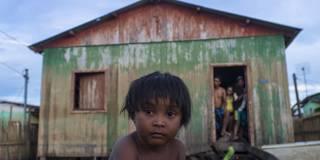With so many adverse, cascading effects, climate change both widens pre-existing social, economic, and ethnic disparities and creates new ones. Policymakers thus will need to focus on ensuring a fairer distribution of obligations not only between states but also across population segments and generations.
SAN JOSÉ – If the United States’ Pledge of Allegiance were rewritten for the world of the twenty-first century, the clause “and justice for all” could well be changed to “and climate justice for all,” given that issue’s paramount importance. A painful lesson from the last few decades – not only in the US but around the world – is that the adverse effects of climate change are not distributed equitably among countries and communities. While the climate crisis has devastating implications for all of us, United Nations Secretary-General António Guterres rightly points out that “the poor and vulnerable are the first to suffer and the worst hit.”

SAN JOSÉ – If the United States’ Pledge of Allegiance were rewritten for the world of the twenty-first century, the clause “and justice for all” could well be changed to “and climate justice for all,” given that issue’s paramount importance. A painful lesson from the last few decades – not only in the US but around the world – is that the adverse effects of climate change are not distributed equitably among countries and communities. While the climate crisis has devastating implications for all of us, United Nations Secretary-General António Guterres rightly points out that “the poor and vulnerable are the first to suffer and the worst hit.”